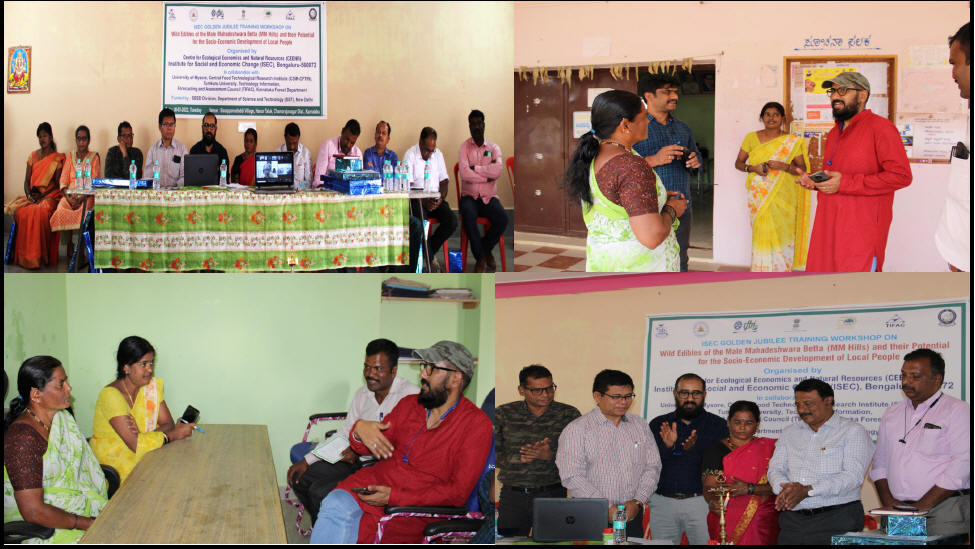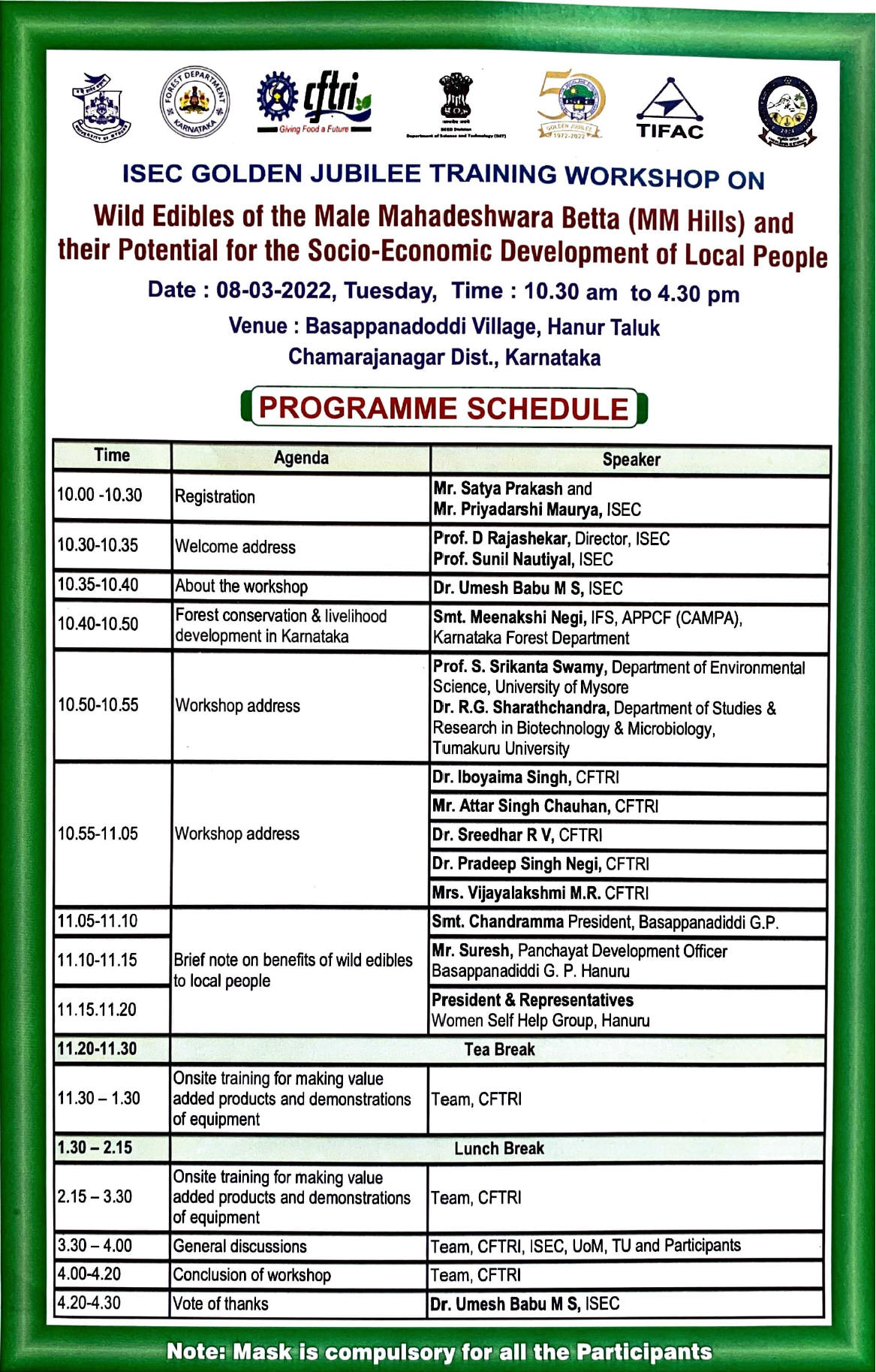|
 Field
level demonstration cum training workshop on “Wild Edibles of the Male
Mahadeshwara Betta (MM Hills) and their potential for the socio-economic
development of local people” was organised by Centre for Ecological
Economics and Natural Resources (CEENR), Institute for Social and
Economic Change (ISEC), Bengaluru at Kanchalli village, Hanur,
Chamrajnagar District on March 08, 2022. This workshop is a part of the
research work in MM Hills on “Exploring Wild Edibles of the Male
Mahadeshwara Betta (MM Hills) and their potential for the socio-economic
development of local people (through scientific and technological
interventions)” and funded by SEED Division, Department of Science and
Technology (DST), New Delhi. This study aims to examine the wild edible
plants (WEP) available in the Male Mahadeshwara (MM Hills) Wildlife
Sanctuary, their uses and the scope of value addition for livelihood
development of local people and sustainable forest management. Field
level demonstration cum training workshop on “Wild Edibles of the Male
Mahadeshwara Betta (MM Hills) and their potential for the socio-economic
development of local people” was organised by Centre for Ecological
Economics and Natural Resources (CEENR), Institute for Social and
Economic Change (ISEC), Bengaluru at Kanchalli village, Hanur,
Chamrajnagar District on March 08, 2022. This workshop is a part of the
research work in MM Hills on “Exploring Wild Edibles of the Male
Mahadeshwara Betta (MM Hills) and their potential for the socio-economic
development of local people (through scientific and technological
interventions)” and funded by SEED Division, Department of Science and
Technology (DST), New Delhi. This study aims to examine the wild edible
plants (WEP) available in the Male Mahadeshwara (MM Hills) Wildlife
Sanctuary, their uses and the scope of value addition for livelihood
development of local people and sustainable forest management.
Male Mahadeshwara Hills
(MM Hills) is a Wildlife Sanctuary located in Western Ghats, Karnataka,
India. Wild edibles are found in abundance in MM Hills region, which has
immense potential to provide nutrition and economic benefits to local
people. The region has experienced changes in lifestyles, livelihood
shifts, preference towards agricultural crops, etc.. The consequences
include a reduction in collection and utilization of wild edibles with
increased wastage and erosion of traditional ecological knowledge. It is
evident that there is a need for scientific and technological
intervention to encourage conservation and sustainable utilization of
wild edibles for socioeconomic development of the local people.
 The
workshop aimed to provide onsite training on value addition of wild
edible plants to the local people for their livelihood development
linking with locally available wild edible plant resources. The workshop
also provided a platform to integrate both theoretical and practical
knowledge, and exchange ideas among local people, academicians, and
resource managers at MM Hills landscape, Chamarajanagar District,
Karnataka. Apart from scientific knowledge exchange, it was also an
opportunity for the local people to enhance their skills and livelihood
from wild edible resources. Scientists from CFTRI Mysore, namely Dr.
Iboyaima Singh, Mr. Attar Singh Chauhan, and Dr. Vijayalakshmi M R and
CEENR, ISEC, Prof. Sunil Nautiyal and team have given onsite training to
the local people on making various the various value-added products
locally available resources. Local people have highly appreciated the
workshop and shown keen interest to adopt the techniques to increase
their income. The machines such as Pulper, Fruit Mill, and Juice
extractor were handed over to Suleripalya Gram Panchayat in the presence
of all the stakeholders for sustained and effective use. Earlier, a Poly
House was constructed in the same village to raise the nursery of wild
edible plants to educate and train the local people about the importance
of wild edibles. The seedlings/saplings of 12 native species were raised
in the nursery and distributed to the local people for growing in their
farming field margins/backyard. Professor Sunil Nautiyal, The
workshop aimed to provide onsite training on value addition of wild
edible plants to the local people for their livelihood development
linking with locally available wild edible plant resources. The workshop
also provided a platform to integrate both theoretical and practical
knowledge, and exchange ideas among local people, academicians, and
resource managers at MM Hills landscape, Chamarajanagar District,
Karnataka. Apart from scientific knowledge exchange, it was also an
opportunity for the local people to enhance their skills and livelihood
from wild edible resources. Scientists from CFTRI Mysore, namely Dr.
Iboyaima Singh, Mr. Attar Singh Chauhan, and Dr. Vijayalakshmi M R and
CEENR, ISEC, Prof. Sunil Nautiyal and team have given onsite training to
the local people on making various the various value-added products
locally available resources. Local people have highly appreciated the
workshop and shown keen interest to adopt the techniques to increase
their income. The machines such as Pulper, Fruit Mill, and Juice
extractor were handed over to Suleripalya Gram Panchayat in the presence
of all the stakeholders for sustained and effective use. Earlier, a Poly
House was constructed in the same village to raise the nursery of wild
edible plants to educate and train the local people about the importance
of wild edibles. The seedlings/saplings of 12 native species were raised
in the nursery and distributed to the local people for growing in their
farming field margins/backyard. Professor Sunil Nautiyal,
 Convenor
who had been working in MM hills landscape for last many years informed
that the training workshop reflects the field realities, issues, and
challenges in problem solving approaches under contemporary debate on
environmental conservation. Professor Sunil Nautiyal has mentioned that
there is a dire need to contribute to biodiversity conservation
alongside the social and economic sustainability of local people
depending on natural resources. The field demonstration models elucidate
that action-oriented research is an important aspect of the academic
activities that balances problem solving actions in collaboration with
all the stakeholders including local societies. The program started with
a welcome address by Professor D Rajasekhar, Director of ISEC and
Professor Sunil Nautiyal, Head of CEENR, ISEC. It was followed by
explaining about the workshop by Dr. Umesh Babu M S, Researcher, CEENR,
ISEC. Mrs. Meenakshi Negi, IFS, Head CAMPA, Karnataka Forest Department
and Mr. Yedukondalu V, IFS, DCF Chamrajnagara addressed the workshop
highlighting the importance of forest resource conservation and
livelihood development of local communities. The workshop remarks were
given by Prof. S. Srikantaswamy, University of Mysore, Dr. R.G.
Sharathchandra, Tumakuru University, Dr. Iboyaima Singh, Mr. Attar Singh
Chauhan, and Dr. Vijayalakshmi M R from CFTRI, Smt. Chandramma,
President and Mr. Suresh PDO from Basappanadoddi Gram Panchayath. More
than 200 participants from neighbouring villages along with stakeholders
attended the workshop. The institutional participation was from the
University of Mysore, Central Food Technological Research Institute (CSIR-CFTRI),
Tumakuru University, Technology Information, Forecasting and Assessment
Council (TIFAC), Karnataka Forest Department. ISEC is celebrating its
Golden Jubilee year and this training workshop was organised as 1st
Golden Jubilee Workshop in the MM Hills landscape. The organizers extend
sincere gratitude to the SEED Division of Department of Science and
Technology (DST), New Delhi, TIFAC, New Delhi and all the stakeholders
for their support and participation in the ISEC’s 1st Golden Jubilee
field level demonstration cum training workshop. Convenor
who had been working in MM hills landscape for last many years informed
that the training workshop reflects the field realities, issues, and
challenges in problem solving approaches under contemporary debate on
environmental conservation. Professor Sunil Nautiyal has mentioned that
there is a dire need to contribute to biodiversity conservation
alongside the social and economic sustainability of local people
depending on natural resources. The field demonstration models elucidate
that action-oriented research is an important aspect of the academic
activities that balances problem solving actions in collaboration with
all the stakeholders including local societies. The program started with
a welcome address by Professor D Rajasekhar, Director of ISEC and
Professor Sunil Nautiyal, Head of CEENR, ISEC. It was followed by
explaining about the workshop by Dr. Umesh Babu M S, Researcher, CEENR,
ISEC. Mrs. Meenakshi Negi, IFS, Head CAMPA, Karnataka Forest Department
and Mr. Yedukondalu V, IFS, DCF Chamrajnagara addressed the workshop
highlighting the importance of forest resource conservation and
livelihood development of local communities. The workshop remarks were
given by Prof. S. Srikantaswamy, University of Mysore, Dr. R.G.
Sharathchandra, Tumakuru University, Dr. Iboyaima Singh, Mr. Attar Singh
Chauhan, and Dr. Vijayalakshmi M R from CFTRI, Smt. Chandramma,
President and Mr. Suresh PDO from Basappanadoddi Gram Panchayath. More
than 200 participants from neighbouring villages along with stakeholders
attended the workshop. The institutional participation was from the
University of Mysore, Central Food Technological Research Institute (CSIR-CFTRI),
Tumakuru University, Technology Information, Forecasting and Assessment
Council (TIFAC), Karnataka Forest Department. ISEC is celebrating its
Golden Jubilee year and this training workshop was organised as 1st
Golden Jubilee Workshop in the MM Hills landscape. The organizers extend
sincere gratitude to the SEED Division of Department of Science and
Technology (DST), New Delhi, TIFAC, New Delhi and all the stakeholders
for their support and participation in the ISEC’s 1st Golden Jubilee
field level demonstration cum training workshop. |
|